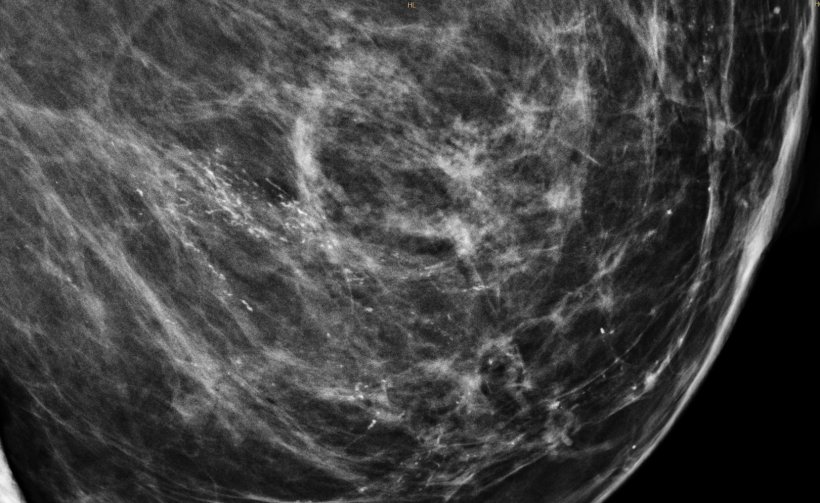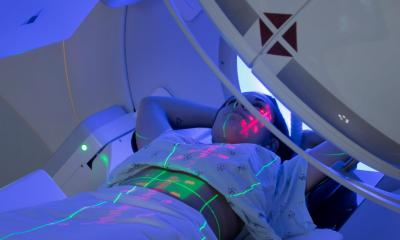© My Ocean studio – stock.adobe.com
Article • Oxford debate at senology congress
DCIS: pros and cons of radiotherapy
Radiologists and gynaecologists entered a veritable bout during the Oxford debate at the 43rd annual congress of the German Senologic Society in Dresden. Controversy was sparked by the question of whether all patients with a ductal carcinoma in situ (DCIS) should undergo radiotherapy.
Article: Sonja Buske
Kicking off the debate, Prof Dr Christoph Mundhenke expressed his bewilderment that the necessity of radiotherapy was called into question in the first place: ‘Data evidence is excellent and strongly in favour of radiotherapy for all patients,’ the Director of the Women’s Health department at Klinikum Bayreuth argued. This was in reference to a large 2010 meta-analysis, covering four clinical studies with more than 3,700 patients over a 10-year follow-up.1 ‘This work highlights the benefits of adjuvant radiotherapy after breast-conserving DCIS treatment. Occurrence of ipsilateral events was cut in half – not only in high-risk patients, but also in older women, who are constantly debated to be excluded from radiotherapy because of their age,’ he added.
Recommended article

Article • Research, diagnostics, treatments
Focus on breast cancer
Breast cancer (breast carcinoma; often abbreviated as BRCA) is the most common cancer in women in many countries and the cancer with the highest mortality rate. The diagnostic and therapeutic options for breast cancer are correspondingly diverse. Keep reading for latest developments in early detection, staging, treatment and research.
Another meta-analysis from 2015, also covering a 10-year follow-up, even included 9,000 patients from 26 clinical studies.2 This study pointed to statistically significant benefits of post-operative radiotherapy, both for DCIS patients and those with invasive recurrence, Mundhenke elaborated. ‘After breast-conserving surgery, the risk for local recurrence was at 25%. Combined with post-op radiotherapy, this number was reduced to 14%.’ While this evidence was ‘virtually overwhelming’, he conceded that in certain cases, other factors, such as the patients’ age, life expectancy and will to treatment, should also be included.
A DCIS diagnosis [...] can be life-changing for these women, who are often haunted by the fear of facing recurrence or an actually invasive form of cancer for years
Stefanie Corradini
This last aspect was taken as a cue by Prof Dr Stefanie Corradini to launch into her counterargument. The perspective of the patients should not be ignored, the Vice Chair of the department of Radiotherapy and Radiation Oncology at LMU Klinikum Munich appealed to her colleagues. ‘A DCIS diagnosis can be very disheartening. Even though it is just a pre-cancerous stage with a good prognosis, it is treated like early invasive breast cancer. This can be life-changing for these women, who are often haunted by the fear of facing recurrence or an actually invasive form of cancer for years,’ Corradini stressed. ‘We have to do everything in our power to prevent recurrence in DCIS.’ For the radiation therapist, the question was therefore not about how, rather than if irradiation should be performed. She argued that an individualised therapy, with adapted fraction and dose regiments as well as reduced irradiation volume was the way to go.

Prof Dr Bernd Gerbers saw things differently. The Director of the University Women’s Hospital at Klinikum Südstadt in Rostock could see neither a survival advantage nor meaningful impact on distant metastases in DCIS radiotherapy. He therefore advocated the adequate treatment of recurrence. ‘Surgical therapies have become better and safer. With the help of mammography, the fringes of micro-lesions are clearly visible, so that surgery can be performed confidently within safe borders,’ the gynaecologist argued. ‘There are even considerations to drop surgery entirely, in favour of a watch-and-wait approach followed by conservative treatment. In case of recurrence, irradiation is still an option.’
Promising molecular biomarkers
Also in opposition of radiotherapy was Prof Dr Volker Budach, from the private practice RadioOnkologie – at least for low-risk patients with decreased local recurrence rates. In high-risk patients, however, radiotherapy is an absolute necessity, he suggested. He pointed out the great potential of molecular biomarkers: ‘Most clinical studies do not yet use molecular biomarkers for DCIS therapy de-escalation,’ Budach explained. ‘Today, there are three individualized molecular biomarker tests, which make it possible to predict whether a patient will develop local recurrence, after breast-conserving surgery with or without adjuvant radiotherapy. To assess the clinical validity of these biomarkers, thorough predictive modelling, calibration and external validation is necessary, as well as level 1B evidence.’
Recommended article

News • Tumor assessment via chromatin imaging
From DCIS to IDC: AI identifies breast cancer stages
Researchers at MIT and ETH Zurich developed an AI model that identifies certain breast cancer stages likely to progress to invasive forms of cancer.
At the end of the session, the speakers and their audience agreed that DCIS is often overtreated, and radiation therapy does not have a beneficial impact on overall survival. Good communication with the patient was seen as crucial. Furthermore, the universal consensus was that the term “carcinoma” should be removed from the condition’s name, to not cause unnecessary alarm for affected women.
Profiles:
Prof. Dr Christoph Mundhenke is Chief Physician at the Clinic for Gynaecology and Obstetrics at Klinikum Bayreuth GmbH. He was previously Head of the Perinatal Centre at the University Hospital Schleswig-Holstein in Kiel. He specializes in gynaecology and obstetrics is a proven expert in the field of gynaecological oncology.
Prof. Dr Stefanie Corradini is Deputy Director of the Clinic and Polyclinic for Radiation Therapy at the LMU Hospital Munich since 2023. Her clinical and scientific focus is on gynaecological tumours and breast carcinomas, MR-guided radiotherapy (MR-Linac) and image-guided radiation therapy procedures with surface scanners.
Prof. Dr Bernd Gerber is Director of the University Women’s Hospital at Klinikum Südstadt in Rostock. His focus is on gynaecological oncology, where he has established gentler operations for patients with breast cancer and thus set new treatment standards in oncology. Prof. Gerber also investigates pregnancy-related diseases (gestosis).
Prof. Volker Budach is a radiologist and radiation therapist at the private practice RadioOnkologie in Berlin. Previously, he was clinical director of the Department of Radiooncology at the Charité as well as Past President of the German Society of Radiation Oncology (DEGRO). His scientific and clinical focus includes the treatment of head and neck tumours, sarcomas and breast cancer.
References:
- Early Breast Cancer Trialists' Collaborative Group (EBCTCG): Overview of the randomized trials of radiotherapy in ductal carcinoma in situ of the breast; Journal of the National Cancer Institute. Monographs 2010
- Stuart KE, Houssami N, Taylor R, Hayen A, Boyages J: Long-term outcomes of ductal carcinoma in situ of the breast: a systematic review, meta-analysis and meta-regression analysis; BMC Cancer 2015
01.09.2024











